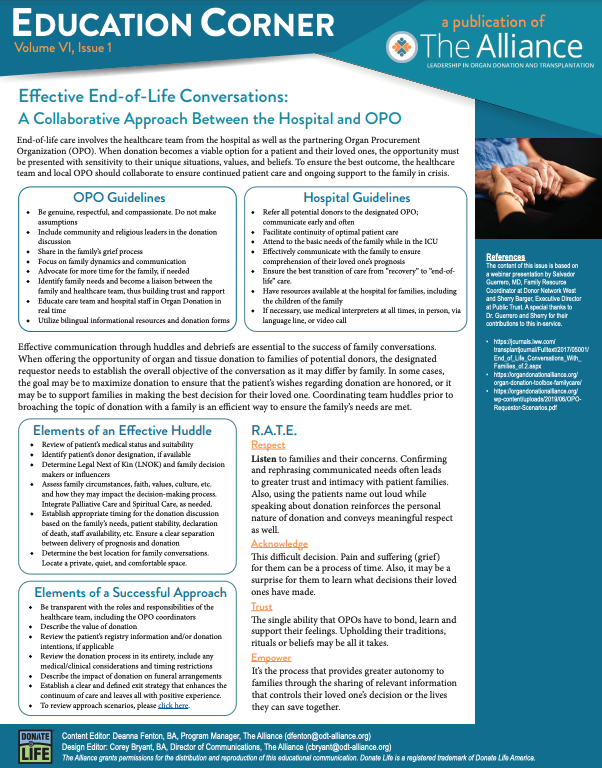End-of-life care involves the healthcare team from the hospital as well as the partnering Organ Procurement Organization (OPO). When donation becomes a viable option for a patient and their loved ones, the opportunity must be presented with sensitivity to their unique situations, values, and beliefs. To ensure the best outcome, the healthcare team and local OPO should collaborate to ensure continued patient care and ongoing support to the family in crisis.
OPO Guidelines
- Be genuine, respectful, and compassionate. Do not make assumptions
- Include community and religious leaders in the donation discussion
- Share in the family’s grief process ◆ Focus on family dynamics and communication
- Advocate for more time for the family, if needed
- Identify family needs and become a liaison between the family and healthcare team, thus building trust and rapport
- Educate care team and hospital staff in Organ Donation in real time
- Utilize bilingual informational resources and donation forms
Hospital Guidelines
- Refer all potential donors to the designated OPO; communicate early and often
- Facilitate continuity of optimal patient care
- Attend to the basic needs of the family while in the ICU
- Effectively communicate with the family to ensure comprehension of their loved one’s prognosis
- Ensure the best transition of care from “recovery” to “end-oflife” care.
- Have resources available at the hospital for families, including the children of the family
- If necessary, use medical interpreters at all times, in person, via language line, or video call
Effective communication through huddles and debriefs are essential to the success of family conversations. When offering the opportunity of organ and tissue donation to families of potential donors, the designated requestor needs to establish the overall objective of the conversation as it may differ by family. In some cases, the goal may be to maximize donation to ensure that the patient’s wishes regarding donation are honored, or it may be to support families in making the best decision for their loved one. Coordinating team huddles prior to broaching the topic of donation with a family is an efficient way to ensure the family’s needs are met.
R.A.T.E.
Respect
Listen to families and their concerns. Confirming and rephrasing communicated needs often leads to greater trust and intimacy with patient families. Also, using the patients name out loud while speaking about donation reinforces the personal nature of donation and conveys meaningful respect as well.
Acknowledge
This difficult decision. Pain and suffering (grief) for them can be a process of time. Also, it may be a surprise for them to learn what decisions their loved ones have made.
Trust
The single ability that OPOs have to bond, learn and support their feelings. Upholding their traditions, rituals or beliefs may be all it takes.
Empower
It’s the process that provides greater autonomy to families through the sharing of relevant information that controls their loved one’s decision or the lives they can save together.
Elements of an Effective Huddle
- Review of patient’s medical status and suitability
- Identify patient’s donor designation, if available
- Determine Legal Next of Kin (LNOK) and family decision makers or influencers
- Assess family circumstances, faith, values, culture, etc. and how they may impact the decision-making process. Integrate Palliative Care and Spiritual Care, as needed.
- Establish appropriate timing for the donation discussion based on the family’s needs, patient stability, declaration of death, staff availability, etc. Ensure a clear separation between delivery of prognosis and donation
- Determine the best location for family conversations. Locate a private, quiet, and comfortable space.
Elements of a Successful Approach
- Be transparent with the roles and responsibilities of the healthcare team, including the OPO coordinators ◆ Describe the value of donation
- Review the patient’s registry information and/or donation intentions, if applicable
- Review the donation process in its entirety, include any medical/clinical considerations and timing restrictions
- Describe the impact of donation on funeral arrangements
- Establish a clear and defined exit strategy that enhances the continuum of care and leaves all with positive experience.
- To review approach scenarios, please click here.
The content of this issue is based on a webinar presentation by Salvador Guerrero, MD, Family Resource Coordinator at Donor Network West and Sherry Barger, Executive Director at Public Trust. A special thanks to Dr. Guerrero and Sherry for their contributions to this in-service.







